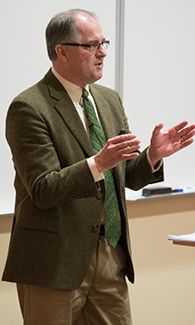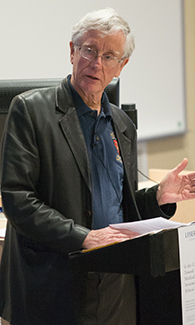Friday, April 29, 2016
LUCOM Medical Library holds symposium to discuss ethics in the medical field
Fri, 29 Apr 2016Shelley Andrews :: LUCOM Marketing and PR
Before students of osteopathic medicine graduate and enter the medical field as physicians, they recite the Osteopathic Oath, once during their White Coat Ceremony and again during graduation, symbolically pledging their commitment to uphold high standards of care for all patients. But what does that oath really mean and how often will a physician be challenged to disagree with not only those words but also their own personal convictions?
In April, the Liberty University College of Osteopathic Medicine (LUCOM) Medical Library hosted a panel of experts to address a question: Is the U.S. working towards dual/parallel medical delivery systems – ethical vs. legal?
“There has been a movement away from a covenantal agreement between the physician and his/her patient, a commitment before God, and instead, a movement toward a legal obligation to provide restricted or demanded medical services on behalf of a third party, often the government,” said Diane Garber, LUCOM head research librarian. “Future physicians need to know what they believe in and why, and they need to take those beliefs seriously.”
As Garber explains, this is a timely topic with policy changes arising in medicine throughout the U.S., and around the world.
“Physicians and student-doctors should be aware of the ramifications of these changes, especially with patient care as governed by a professional oath,” said Garber.
The panel of experts included Ray Morrison, D.O., LUCOM chair of surgery in the Department of Specialty Medicine, and Shanna Akers, Ed.D., MSN/MBA-HC, RN, CNE, Associate Dean of Liberty University School of Nursing.
Dr. Morrison addressed the significance of the Osteopathic Oath while Dr. Akers focused on the Florence Nightingale Pledge. The Osteopathic Oath includes a statement addressing a morality issue: “I will give no drugs for deadly purposes to any person, though it be asked of me.”
“Reciting the Osteopathic Oath is an establishment of trust. When we say it publically, we have made our marriage vows to our profession. And when we recite the oath, it’s something we do by convention. Oaths are not legally binding. They are a collection of ideas,” said Dr. Morrison.
Eugene Patterson, Ph.D., LUCOM professor of pharmacology, discussed Germany’s history when Dutch physicians defied the Nazis and refused to violate their personal conscience. Their Hippocratic Oath was not violated even when mandated by law.

“You don’t need legal standards if you have a higher ethical standard. But to reach that higher standard, there needs to be the agreement of society and physicians and most of all the government,” said Dr. Patterson.
Phillip Kline, assistant professor at Liberty University School of Law, spoke about the dangers in the current legal environment and how physicians must be aware of situations where they could be forced to comply with the law even when it violates personal conscience.
Closing out the symposium, John Patrick, M.D., Christian Medical and Dental Society in Canada, pointed out that physicians must be committed to four principles: transcendence, morality, the sanctity of human life and rights of conscience.
In regards to rights of conscience, a doctor’s rights may be in jeopardy within the frame work of the current legal and political situation. Society today often places pressure on the physician to perform procedures that violate his or her faith and moral standards.
“In the modern world, Christians must not merely make statements about moral issues, they must ask questions and take action,” said Dr. Patrick. “When a mentor asks a student to do something that is immoral in their eyes because the student is a Christian, they should not merely say ‘no.’ They should say, ‘Before I obey you, may I ask you a question? Do you wish you and your family to be cared by someone with or without moral integrity?” said Dr. Patrick.
 Dr. Patrick also addressed the main question and title of the symposium, “Is the U.S. working towards dual/parallel medical delivery systems, ethical vs. legal?”
Dr. Patrick also addressed the main question and title of the symposium, “Is the U.S. working towards dual/parallel medical delivery systems, ethical vs. legal?”
“I have no doubts whatsoever that we will either divide our society or we will lose our moral compass, because the two systems are not compatible with one another. Societies can only be defined by what they hold in common,” said Dr. Patrick.
While the topic is complex and evolving, the goal was for student-doctors, health care providers and physicians to leave the symposium with a confident outlook about upholding their Christian values.
“My hope is that those who attended understand the importance of practicing their medical profession consistent with their faith in God and according to Biblical standards. I hope they are ready to give a bold, reasoned defense when their personal rights of conscience are threatened,” said Garber.